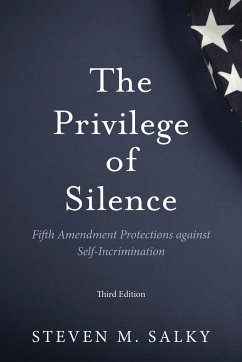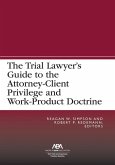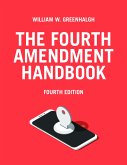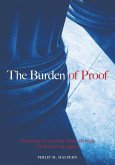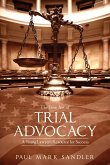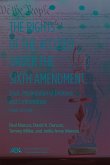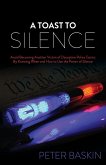Steven M Salky
The Privilege of Silence
Fifth Amendment Protections Against Self-Incrimination, Third Edition
Steven M Salky
The Privilege of Silence
Fifth Amendment Protections Against Self-Incrimination, Third Edition
- Broschiertes Buch
- Merkliste
- Auf die Merkliste
- Bewerten Bewerten
- Teilen
- Produkt teilen
- Produkterinnerung
- Produkterinnerung
This guide is designed as a basic research tool to aid practicing lawyers in thinking about and applying the Fifth Amendment privilege in various contexts and proceedings. This third edition not only updates the second edition with more recent court decisions but also expands the prior discussion on certain topics in order to elucidate, or in some instances question, a trend or a decision.
Andere Kunden interessierten sich auch für
![The Trial Lawyer's Guide to the Attorney-Client Privilege and Work-Product Doctrine The Trial Lawyer's Guide to the Attorney-Client Privilege and Work-Product Doctrine]() The Trial Lawyer's Guide to the Attorney-Client Privilege and Work-Product Doctrine215,99 €
The Trial Lawyer's Guide to the Attorney-Client Privilege and Work-Product Doctrine215,99 €![The Fourth Amendment Handbook, Fourth Edition The Fourth Amendment Handbook, Fourth Edition]() William W GreenhalghThe Fourth Amendment Handbook, Fourth Edition120,99 €
William W GreenhalghThe Fourth Amendment Handbook, Fourth Edition120,99 €![The Burden of Proof The Burden of Proof]() Philip M HalpernThe Burden of Proof108,99 €
Philip M HalpernThe Burden of Proof108,99 €![The Fine Art of Trial Advocacy The Fine Art of Trial Advocacy]() Paul Mark SandlerThe Fine Art of Trial Advocacy120,99 €
Paul Mark SandlerThe Fine Art of Trial Advocacy120,99 €![The Rights of the Accused Under the Sixth Amendmen The Rights of the Accused Under the Sixth Amendmen]() Paul MarcusThe Rights of the Accused Under the Sixth Amendmen152,99 €
Paul MarcusThe Rights of the Accused Under the Sixth Amendmen152,99 €![A Toast to Silence A Toast to Silence]() Peter BaskinA Toast to Silence17,99 €
Peter BaskinA Toast to Silence17,99 €![What If I Say the Wrong Thing? What If I Say the Wrong Thing?]() Vern Myers &What If I Say the Wrong Thing?14,99 €
Vern Myers &What If I Say the Wrong Thing?14,99 €-
-
-
This guide is designed as a basic research tool to aid practicing lawyers in thinking about and applying the Fifth Amendment privilege in various contexts and proceedings. This third edition not only updates the second edition with more recent court decisions but also expands the prior discussion on certain topics in order to elucidate, or in some instances question, a trend or a decision.
Hinweis: Dieser Artikel kann nur an eine deutsche Lieferadresse ausgeliefert werden.
Hinweis: Dieser Artikel kann nur an eine deutsche Lieferadresse ausgeliefert werden.
Produktdetails
- Produktdetails
- Verlag: American Bar Association
- 3rd edition
- Seitenzahl: 370
- Erscheinungstermin: 7. November 2020
- Englisch
- Abmessung: 226mm x 152mm x 20mm
- Gewicht: 522g
- ISBN-13: 9781641055192
- ISBN-10: 1641055197
- Artikelnr.: 58520813
- Herstellerkennzeichnung
- Libri GmbH
- Europaallee 1
- 36244 Bad Hersfeld
- gpsr@libri.de
- Verlag: American Bar Association
- 3rd edition
- Seitenzahl: 370
- Erscheinungstermin: 7. November 2020
- Englisch
- Abmessung: 226mm x 152mm x 20mm
- Gewicht: 522g
- ISBN-13: 9781641055192
- ISBN-10: 1641055197
- Artikelnr.: 58520813
- Herstellerkennzeichnung
- Libri GmbH
- Europaallee 1
- 36244 Bad Hersfeld
- gpsr@libri.de
Steven Salky, a partner at Zuckerman Spaeder, LLP, represents individuals in white collar criminal cases, regulatory agency investigations, and civil litigation. He has extensive experience representing executives of public companies in securities fraud investigations and parallel civil litigations and has spent much of the past five years representing the former chief financial officers of Freddie Mac and Fannie Mae in proceedings arising from these companies' restatements of earnings. He regularly represents executives in environmental, antitrust, and healthcare fraud investigations, as well as professionals, including lawyers, doctors, and accountants, in litigation involving their compliance with professional obligations. While in law school Mr. Salky was awarded the Harlan Fiske Stone prize for the best oralist in Yale Law School's Moot Court Competition. After graduating from law school, Mr. Salky clerked for then Chief Judge Theodore R. Newman, Jr., of the District of Columbia Court of Appeals, before beginning a two-year teaching fellowship at the Georgetown University Law Center. As the Stuart Stiller Fellow at Georgetown's Criminal Justice Clinic, he represented indigent criminal defendants and supervised third-year law students in court.
Preface vii About the Author ix Introduction xi Chapter 1: The Purpose and Scope of the Fifth Amendment Right Against Compulsory Self-Incrimination 1 A Very Brief History of the Fifth Amendment 1 Values Served by the Fifth Amendment 5 Chapter 2: Elements of the Fifth Amendment 13 The Meaning of Self-Incrimination 13 The Meaning of Compulsion 23 General Propositions 23 Private Compulsion vs. Government Compulsion 33 The Meaning of Testimonial Communication 40 Absence of a Fifth Amendment Privilege for Collective Entities 51 The Meaning of
Any Criminal Case
62 Chapter 3: Proceedings in Which the Fifth Amendment May Be Asserted and the Consequences of Remaining Silent 69 Assertions of the Fifth Amendment Right Against Self- Incrimination in Criminal Proceedings and the Consequences of Invoking and/or Remaining Silent 72 During Custodial Police Interrogation 72 During Non-Custodial Police Interrogation 91 During Grand Jury Proceedings 93 Procedures for Invoking the Fifth Amendment in the Grand Jury 94 Absence of a Fifth Amendment Privilege in Response to Grand Jury Subpoena for Documents That Incriminate Others 100 Absence of Protection Against Grand Jury Considering Evidence Previously Obtained in Violation of the Fifth Amendment 102 Fifth Amendment Rights of the Trial Witness 117 During Post-Trial Proceedings 120 During Probation and Parole 125 Distinguishing Non-Criminal from Criminal Proceedings 130 Assertions of the Fifth Amendment Right Against Self- Incrimination in Non-Criminal Proceedings and the Consequences of Invoking and/or Remaining Silent 135 During Civil Cases 135 During Administrative Proceedings and Agency Investigations 144 During Legislative Proceedings 145 During Responses to Government Reporting Demands 148 Legal Consequences of Asserting the Fifth Amendment in Non-Criminal Cases 153 The Adverse Inference 153 Other Consequences of Asserting the Fifth Amendment in Non-Criminal Proceedings 167 Granting Stays in Civil Cases During Parallel Criminal Proceedings 173 Chapter 4: The Process for Determining the Validity of the Assertion 181 Procedures for Determining the Validity of Fifth Amendment Assertions in Grand Jury Proceedings 183 Procedures for Determining the Validity of Fifth Amendment Assertions by Witnesses in a Criminal Trial 189 Procedures for Determining the Validity of Fifth Amendment Assertions in Non-Criminal Proceedings 194 Procedures for Determining the Validity of Fifth Amendment Assertions in Legislative Proceedings 195 Procedures for Determining the Validity of Fifth Amendment Assertions with Regard to Document Production 200 Chapter 5: How the Right Should Be Asserted 203 How Little Can or Should One Say? 205 How Much Can or Should One Say? 210 Chapter 6: Stigma and the Fifth Amendment 215 Chapter 7: Waiver and Risk of Waiver 219 General Principles 219 Waiver Is Proceeding-Specific 219 Waiver Must Be Voluntary 227 Waiver Need Not Be Knowing 229 Waiver in Various Contexts 237 Waiver of Miranda Rights 237 Testimonial Waiver in Grand Jury Proceedings 241 Waiver by Pleading Guilty 244 Waiver in Criminal Trials 244 Testimonial Waivers in Legislative Proceedings 252 Waiver in Other Non-Criminal Proceedings 254 Waiver in Connection with Production of Documents 256 Chapter 8: Documents and the Fifth Amendment: The Act of Production Privilege 259 The
Foregone Conclusion
Exception to the Act of Production Privilege 262 Application of the Act of Production Privilege to Demands for Documents Made to Third Parties 270 The
Required Records
Exception to the Act of Production Privilege 271 Chapter 9: Immunity 279 Use and Derivative Use Immunity Is Constitutional 279 The Use of Evidence Obtained Through Immunity Granted Pursuant to 18 U.S.C. § 6002 286 The Use of Documents Obtained Through Immunity Granted Pursuant to 18 U.S.C. § 6002 293 18 U.S.C. § 6002 and
Ancillary Proceedings
295
Garrity
Immunity 295 Informal Use and Derivative Use or
Letter
Immunity 301 Court Authority to Grant or Deny Immunity 309 Chapter 10: The Future of the Fifth Amendment 315 Epilogue: A Brief Rejoinder to Justice Thomas 319 Table of Cases 325 Index 363
Any Criminal Case
62 Chapter 3: Proceedings in Which the Fifth Amendment May Be Asserted and the Consequences of Remaining Silent 69 Assertions of the Fifth Amendment Right Against Self- Incrimination in Criminal Proceedings and the Consequences of Invoking and/or Remaining Silent 72 During Custodial Police Interrogation 72 During Non-Custodial Police Interrogation 91 During Grand Jury Proceedings 93 Procedures for Invoking the Fifth Amendment in the Grand Jury 94 Absence of a Fifth Amendment Privilege in Response to Grand Jury Subpoena for Documents That Incriminate Others 100 Absence of Protection Against Grand Jury Considering Evidence Previously Obtained in Violation of the Fifth Amendment 102 Fifth Amendment Rights of the Trial Witness 117 During Post-Trial Proceedings 120 During Probation and Parole 125 Distinguishing Non-Criminal from Criminal Proceedings 130 Assertions of the Fifth Amendment Right Against Self- Incrimination in Non-Criminal Proceedings and the Consequences of Invoking and/or Remaining Silent 135 During Civil Cases 135 During Administrative Proceedings and Agency Investigations 144 During Legislative Proceedings 145 During Responses to Government Reporting Demands 148 Legal Consequences of Asserting the Fifth Amendment in Non-Criminal Cases 153 The Adverse Inference 153 Other Consequences of Asserting the Fifth Amendment in Non-Criminal Proceedings 167 Granting Stays in Civil Cases During Parallel Criminal Proceedings 173 Chapter 4: The Process for Determining the Validity of the Assertion 181 Procedures for Determining the Validity of Fifth Amendment Assertions in Grand Jury Proceedings 183 Procedures for Determining the Validity of Fifth Amendment Assertions by Witnesses in a Criminal Trial 189 Procedures for Determining the Validity of Fifth Amendment Assertions in Non-Criminal Proceedings 194 Procedures for Determining the Validity of Fifth Amendment Assertions in Legislative Proceedings 195 Procedures for Determining the Validity of Fifth Amendment Assertions with Regard to Document Production 200 Chapter 5: How the Right Should Be Asserted 203 How Little Can or Should One Say? 205 How Much Can or Should One Say? 210 Chapter 6: Stigma and the Fifth Amendment 215 Chapter 7: Waiver and Risk of Waiver 219 General Principles 219 Waiver Is Proceeding-Specific 219 Waiver Must Be Voluntary 227 Waiver Need Not Be Knowing 229 Waiver in Various Contexts 237 Waiver of Miranda Rights 237 Testimonial Waiver in Grand Jury Proceedings 241 Waiver by Pleading Guilty 244 Waiver in Criminal Trials 244 Testimonial Waivers in Legislative Proceedings 252 Waiver in Other Non-Criminal Proceedings 254 Waiver in Connection with Production of Documents 256 Chapter 8: Documents and the Fifth Amendment: The Act of Production Privilege 259 The
Foregone Conclusion
Exception to the Act of Production Privilege 262 Application of the Act of Production Privilege to Demands for Documents Made to Third Parties 270 The
Required Records
Exception to the Act of Production Privilege 271 Chapter 9: Immunity 279 Use and Derivative Use Immunity Is Constitutional 279 The Use of Evidence Obtained Through Immunity Granted Pursuant to 18 U.S.C. § 6002 286 The Use of Documents Obtained Through Immunity Granted Pursuant to 18 U.S.C. § 6002 293 18 U.S.C. § 6002 and
Ancillary Proceedings
295
Garrity
Immunity 295 Informal Use and Derivative Use or
Letter
Immunity 301 Court Authority to Grant or Deny Immunity 309 Chapter 10: The Future of the Fifth Amendment 315 Epilogue: A Brief Rejoinder to Justice Thomas 319 Table of Cases 325 Index 363
Preface vii About the Author ix Introduction xi Chapter 1: The Purpose and Scope of the Fifth Amendment Right Against Compulsory Self-Incrimination 1 A Very Brief History of the Fifth Amendment 1 Values Served by the Fifth Amendment 5 Chapter 2: Elements of the Fifth Amendment 13 The Meaning of Self-Incrimination 13 The Meaning of Compulsion 23 General Propositions 23 Private Compulsion vs. Government Compulsion 33 The Meaning of Testimonial Communication 40 Absence of a Fifth Amendment Privilege for Collective Entities 51 The Meaning of
Any Criminal Case
62 Chapter 3: Proceedings in Which the Fifth Amendment May Be Asserted and the Consequences of Remaining Silent 69 Assertions of the Fifth Amendment Right Against Self- Incrimination in Criminal Proceedings and the Consequences of Invoking and/or Remaining Silent 72 During Custodial Police Interrogation 72 During Non-Custodial Police Interrogation 91 During Grand Jury Proceedings 93 Procedures for Invoking the Fifth Amendment in the Grand Jury 94 Absence of a Fifth Amendment Privilege in Response to Grand Jury Subpoena for Documents That Incriminate Others 100 Absence of Protection Against Grand Jury Considering Evidence Previously Obtained in Violation of the Fifth Amendment 102 Fifth Amendment Rights of the Trial Witness 117 During Post-Trial Proceedings 120 During Probation and Parole 125 Distinguishing Non-Criminal from Criminal Proceedings 130 Assertions of the Fifth Amendment Right Against Self- Incrimination in Non-Criminal Proceedings and the Consequences of Invoking and/or Remaining Silent 135 During Civil Cases 135 During Administrative Proceedings and Agency Investigations 144 During Legislative Proceedings 145 During Responses to Government Reporting Demands 148 Legal Consequences of Asserting the Fifth Amendment in Non-Criminal Cases 153 The Adverse Inference 153 Other Consequences of Asserting the Fifth Amendment in Non-Criminal Proceedings 167 Granting Stays in Civil Cases During Parallel Criminal Proceedings 173 Chapter 4: The Process for Determining the Validity of the Assertion 181 Procedures for Determining the Validity of Fifth Amendment Assertions in Grand Jury Proceedings 183 Procedures for Determining the Validity of Fifth Amendment Assertions by Witnesses in a Criminal Trial 189 Procedures for Determining the Validity of Fifth Amendment Assertions in Non-Criminal Proceedings 194 Procedures for Determining the Validity of Fifth Amendment Assertions in Legislative Proceedings 195 Procedures for Determining the Validity of Fifth Amendment Assertions with Regard to Document Production 200 Chapter 5: How the Right Should Be Asserted 203 How Little Can or Should One Say? 205 How Much Can or Should One Say? 210 Chapter 6: Stigma and the Fifth Amendment 215 Chapter 7: Waiver and Risk of Waiver 219 General Principles 219 Waiver Is Proceeding-Specific 219 Waiver Must Be Voluntary 227 Waiver Need Not Be Knowing 229 Waiver in Various Contexts 237 Waiver of Miranda Rights 237 Testimonial Waiver in Grand Jury Proceedings 241 Waiver by Pleading Guilty 244 Waiver in Criminal Trials 244 Testimonial Waivers in Legislative Proceedings 252 Waiver in Other Non-Criminal Proceedings 254 Waiver in Connection with Production of Documents 256 Chapter 8: Documents and the Fifth Amendment: The Act of Production Privilege 259 The
Foregone Conclusion
Exception to the Act of Production Privilege 262 Application of the Act of Production Privilege to Demands for Documents Made to Third Parties 270 The
Required Records
Exception to the Act of Production Privilege 271 Chapter 9: Immunity 279 Use and Derivative Use Immunity Is Constitutional 279 The Use of Evidence Obtained Through Immunity Granted Pursuant to 18 U.S.C. § 6002 286 The Use of Documents Obtained Through Immunity Granted Pursuant to 18 U.S.C. § 6002 293 18 U.S.C. § 6002 and
Ancillary Proceedings
295
Garrity
Immunity 295 Informal Use and Derivative Use or
Letter
Immunity 301 Court Authority to Grant or Deny Immunity 309 Chapter 10: The Future of the Fifth Amendment 315 Epilogue: A Brief Rejoinder to Justice Thomas 319 Table of Cases 325 Index 363
Any Criminal Case
62 Chapter 3: Proceedings in Which the Fifth Amendment May Be Asserted and the Consequences of Remaining Silent 69 Assertions of the Fifth Amendment Right Against Self- Incrimination in Criminal Proceedings and the Consequences of Invoking and/or Remaining Silent 72 During Custodial Police Interrogation 72 During Non-Custodial Police Interrogation 91 During Grand Jury Proceedings 93 Procedures for Invoking the Fifth Amendment in the Grand Jury 94 Absence of a Fifth Amendment Privilege in Response to Grand Jury Subpoena for Documents That Incriminate Others 100 Absence of Protection Against Grand Jury Considering Evidence Previously Obtained in Violation of the Fifth Amendment 102 Fifth Amendment Rights of the Trial Witness 117 During Post-Trial Proceedings 120 During Probation and Parole 125 Distinguishing Non-Criminal from Criminal Proceedings 130 Assertions of the Fifth Amendment Right Against Self- Incrimination in Non-Criminal Proceedings and the Consequences of Invoking and/or Remaining Silent 135 During Civil Cases 135 During Administrative Proceedings and Agency Investigations 144 During Legislative Proceedings 145 During Responses to Government Reporting Demands 148 Legal Consequences of Asserting the Fifth Amendment in Non-Criminal Cases 153 The Adverse Inference 153 Other Consequences of Asserting the Fifth Amendment in Non-Criminal Proceedings 167 Granting Stays in Civil Cases During Parallel Criminal Proceedings 173 Chapter 4: The Process for Determining the Validity of the Assertion 181 Procedures for Determining the Validity of Fifth Amendment Assertions in Grand Jury Proceedings 183 Procedures for Determining the Validity of Fifth Amendment Assertions by Witnesses in a Criminal Trial 189 Procedures for Determining the Validity of Fifth Amendment Assertions in Non-Criminal Proceedings 194 Procedures for Determining the Validity of Fifth Amendment Assertions in Legislative Proceedings 195 Procedures for Determining the Validity of Fifth Amendment Assertions with Regard to Document Production 200 Chapter 5: How the Right Should Be Asserted 203 How Little Can or Should One Say? 205 How Much Can or Should One Say? 210 Chapter 6: Stigma and the Fifth Amendment 215 Chapter 7: Waiver and Risk of Waiver 219 General Principles 219 Waiver Is Proceeding-Specific 219 Waiver Must Be Voluntary 227 Waiver Need Not Be Knowing 229 Waiver in Various Contexts 237 Waiver of Miranda Rights 237 Testimonial Waiver in Grand Jury Proceedings 241 Waiver by Pleading Guilty 244 Waiver in Criminal Trials 244 Testimonial Waivers in Legislative Proceedings 252 Waiver in Other Non-Criminal Proceedings 254 Waiver in Connection with Production of Documents 256 Chapter 8: Documents and the Fifth Amendment: The Act of Production Privilege 259 The
Foregone Conclusion
Exception to the Act of Production Privilege 262 Application of the Act of Production Privilege to Demands for Documents Made to Third Parties 270 The
Required Records
Exception to the Act of Production Privilege 271 Chapter 9: Immunity 279 Use and Derivative Use Immunity Is Constitutional 279 The Use of Evidence Obtained Through Immunity Granted Pursuant to 18 U.S.C. § 6002 286 The Use of Documents Obtained Through Immunity Granted Pursuant to 18 U.S.C. § 6002 293 18 U.S.C. § 6002 and
Ancillary Proceedings
295
Garrity
Immunity 295 Informal Use and Derivative Use or
Letter
Immunity 301 Court Authority to Grant or Deny Immunity 309 Chapter 10: The Future of the Fifth Amendment 315 Epilogue: A Brief Rejoinder to Justice Thomas 319 Table of Cases 325 Index 363

